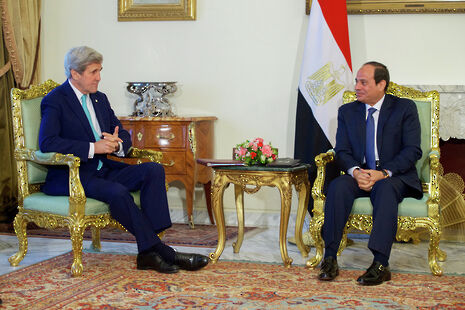During the Regeni case, the West have not done nearly enough
Western governments like Italy and the US are doing shamefully little about the case of Giulio Regeni, the Cambridge PhD student who was tortured and murdered in Egypt, because they need an ally in the Middle East, Ed McNally argues

In February 2016, Giulio Regeni’s mutilated body was discovered propped up against a wall on the roadside in western Cairo. The 28-year old Cambridge PhD student had been in Egypt to research independent trade unions, focusing on street vendors, and had disappeared days before. His guide to Cairo’s streets and their labour politics, a union official, had passed information about Regeni’s activities to state security services.
As details of the murder emerged, with the autopsy finding evidence of brutal and protracted torture consistent with that inflicted routinely on hundreds of Egyptians by the regime, a diplomatic crisis ensued between Regeni’s native Italy and Egypt. Within weeks, the US State Department is reported to have had "incontrovertible evidence", according to a senior Obama official, shared in part with Rome, that Egyptian State Security (now called Homeland Security) personnel were behind the torture and murder.
The regime of Abdel Fattah el-Sisi mounted a systematic cover up, which included a claim to have shot dead four men whom the regime claimed were responsible for Regeni’s murder. Regeni’s passport had been ‘found’ in the apartment of the deceased gang. The fabricated web of evidence quickly disintegrated when subjected to attention by Italian investigators.
"Another reason for Egypt’s impunity in murdering its citizens is its enthusiastic appropriation of the ‘war on terror’."
With the case remaining officially unsolved, and despite initial outrage, normality has returned to relations between Egypt, Italy, and its Western allies. The treatment inflicted upon Giulio Regeni is a relatively common occurrence in the country, with an average of three to four Egyptians forcibly ‘disappeared’ daily. Today, fleeting indignation at Regeni’s murder has been replaced by customary silence on the habitual abuse of human rights in Sisi’s Egypt. Why?
One answer is that Egypt’s secretive and highly repressive state security apparatus has long been a convenient partner of the West. Under the autocratic rule of both Anwar Sadat and Hosni Mubarak, Egypt served as an early ‘poster-child’ for neoliberal reforms. After Sadat made cuts to food subsidies worth hundreds of millions of dollars in 1977 under World Bank auspices, spontaneous strikes erupted and the military were deployed to put down the ‘unrest’. 79 people died in riots.
Rural resistance to the privatisation of agricultural land, part of Mubarak’s 1991 IMF Structural Adjustment Programme, was met with similar violence. The Egyptian state has been shaped in the past forty years by two symbiotic objectives; the consolidation of military control, and the creation of an ‘investment climate’ amenable to the needs of Western capital. Whilst the proportion of the population below the international poverty line skyrocketed from 20 percent to 44 per cent under Mubarak, spending on the Ministry of Interior—home of State Security—totalled more than health and education combined. State Security, now ‘Homeland Security’, remains instrumental in repressing independent democratic unions, central to the 2011 revolution and researched by Regeni.
Is it any wonder, then, that the Egyptian state, much lauded as a model of neoliberal restructuring, can murder a Cambridge graduate student and thousands of its own citizens with impunity? Mubarak was after all considered a “friends of my family” by Hillary Clinton, “immensely courageous and a force for good” by Tony Blair. Perhaps most egregious in retrospect is the declaration of Matteo Renzi, Italian PM at the time of Regeni’s murder, to Sisi at a major international investment conference: “Your war is our war, and your stability is our stability”.
Another reason for Sisi’s legitimacy in the West and Egypt’s impunity in murdering its citizens is his enthusiastic appropriation of the ‘war on terror’ and its attendant Islamophobic lexicon. This embrace is both material—Egypt was a key partner in the CIA’s extraordinary rendition programme—and rhetorical. The identification of Muslims and political Islam as a unique threat to ‘national security’ is an ideological thread that ties together the UK government’s Prevent strategy, Donald Trump’s travel ban and the repression of the Muslim Brotherhood in Egypt.
Sisi, in posturing as a ‘secular’ leader protecting Egypt and the world from the barbarian Islamic hordes, is at one with racist thought embedded deep in Europe’s political and intellectual mainstream. The demand by Cambridge Union regular and best-selling author Douglas Murray that “conditions for Muslims in Europe must be made harder across the board” would chime well with pretexts for state terror mobilised in Egypt. The same can be said for the liberal analysis of terrorism, which implicitly pathologises Muslims as uniquely disposed to extremism.
The long search for justice for Giulio Regeni and the thousands of Egyptians who have faced a similar fate should look not only to Cairo, but at complicity closer to home
 Features / Should I stay or should I go? Cambridge students and alumni reflect on how their memories stay with them15 December 2025
Features / Should I stay or should I go? Cambridge students and alumni reflect on how their memories stay with them15 December 2025 News / Cambridge study finds students learn better with notes than AI13 December 2025
News / Cambridge study finds students learn better with notes than AI13 December 2025 News / Dons warn PM about Vet School closure16 December 2025
News / Dons warn PM about Vet School closure16 December 2025 Comment / The magic of an eight-week term15 December 2025
Comment / The magic of an eight-week term15 December 2025 News / News In Brief: Michaelmas marriages, monogamous mammals, and messaging manipulation15 December 2025
News / News In Brief: Michaelmas marriages, monogamous mammals, and messaging manipulation15 December 2025









